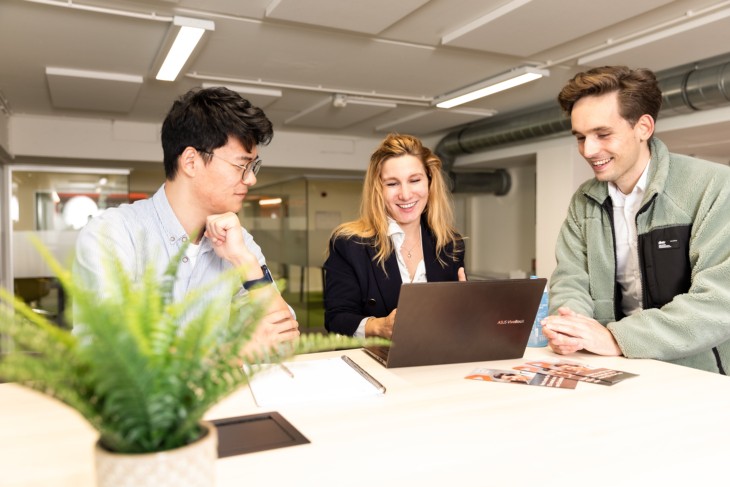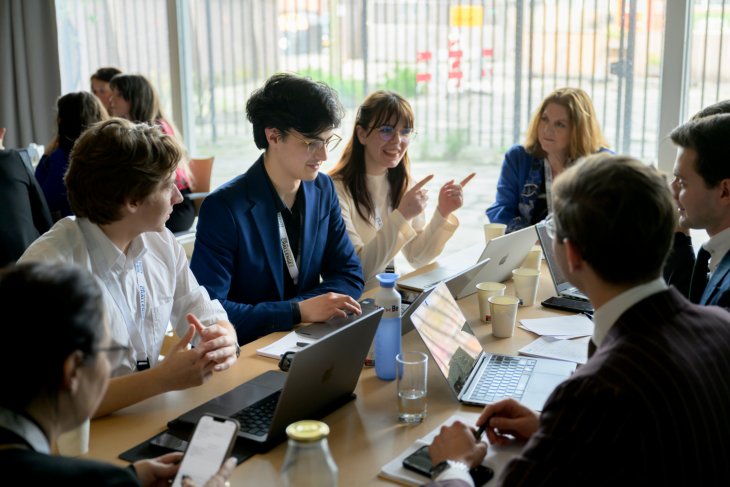Hi, Richard! Before we get into all things negotiation, do you mind introducing yourself?
- Richard

Sure! My name is Richard, I’m 22 years old and I moved from Romania to Enschede almost three years ago. Currently, I’m in the third year of the Bachelor’s in Technical Computer Science and besides, I’m a board member of the Negotiation Project Twente.
Nice to meet you! So, first things first, what is negotiation really – besides classic bargaining – and why is it so important?
- Richard

Good question! Negotiations can be anything really - from salary negotiations and splitting company shares to arguing with your housemates about who has to do the dishes or which of your project members does what. Basically, any situation that results in a trade-off can be considered a negotiation, and the goal is to achieve an outcome that is beneficial for every party.
Thinking about it, you probably run into such trade-offs almost daily: that’s also why negotiation is such an important skill! Negotiating isn’t limited to professional settings – actually, quite the opposite. Learning some negotiation techniques can be helpful in many daily situations, and as an extra plus, it also helps you develop your presentation-, debating- and social skills.
Sounds interesting! So, how did you get into negotiating professionally?
- Richard

Well, up until the second year of my study I wasn’t necessarily active in terms of extracurricular activities: I was a member of the study association Inter-Actief and joined some events, but that was it. However, about a year ago, I met someone who told me about the Negotiation Project Twente (NPT), which organises long-term courses for students who want to learn how to negotiate. They invited me to try it out, and I have never left since!
How does that work?
- Richard

The NPT course runs every academic year, from October until May. After you’ve signed up, you get invited to a try-out session to find out if the course is something for you because – let’s be honest – meeting every Thursday evening for half a year may sound a bit intense at first. However, our meetings are of course not just negotiating, but also a lot of fun and just hanging out!
In our weekly sessions, we always discuss some theories about, for example, body language, negotiation strategies, psychological responses or the interpretation of numbers. After that we practice with cases: sometimes solo, but most often in teams of three. The teachers give you immediate feedback and in my experience, you usually improve quickly. So fast that by the end of the course, you can compete in international competitions if you want!
Wow, that’s so cool! Tell us about it.
- Richard

A few weeks ago, I – and a lot of my fellow student negotiators from UT and Saxion – participated in the Negotiation Challenge 2024: an international competition with 66 teams that took place in Enschede this year, organised by Dr. Hatice Kizgin and her team. We negotiated about all kinds of cases, from obtaining shares to negotiating with AI.
Negotiating with AI?
- Richard

Yeah… we really had to get creative with that one. 😂 Our team had to negotiate with a chatbot, to try and buy the specific software of the AI itself. That was quite strange, because body language, listening and social interactions are such a huge part of successful negotiations, and of course, that was missing. But I guess our efforts did pay off because, in the end, we won first place! We really had a blast.
The winning team: Richard Botez, Diana Bozea and Artur Dylewski (from left to right). Congrats! That’s an amazing achievement. So, what would you advise other students who may want to get into negotiating?
- Richard

Join the NPT! Haha. No, but really: go for it! As a student, now is the time to try out new things and develop yourself. A lot of courses are cheap - in our case, free of charge even - and it’s a great way to meet new people, also outside of your study programme. Whether it is through NPT, the Great Negotiators Honours track (for master’s Honours students) or by just practising with fellow students: give it a try and you’ll notice quickly how valuable it is.
And what about some quick tips to instantly up your negotiation game?
- Richard

Practice, practice, practice! And then: record yourself or ask someone to give feedback. Awkward, I know, but it’s the best way to improve: there are so many things you might do that you’re not even aware of, such as fidgeting, asking the wrong questions or barely listening to the other party. Especially the last part is important. In negotiations, half of the time it’s not about what is being said, but about what is not being said. What does the other party want? Who is in the power position? It takes some time and it’s confronting at first, but in the end, everyone can learn how to negotiate better! You just have to start. 😊
Related stories
 student Well-beingStudy stress? 5 ways to stay hopeful as a studentStudying is exciting and challenging, but at times also stressful. Deadlines, exams and the pressure to perform can easily throw you off balance. According to Professor Ernst Bohlmeijer, professor of psychology at the University of Twente, hope can help. Not a vague sense that everything will work out by itself, but an attitude that makes you stronger, especially in stressful times.
student Well-beingStudy stress? 5 ways to stay hopeful as a studentStudying is exciting and challenging, but at times also stressful. Deadlines, exams and the pressure to perform can easily throw you off balance. According to Professor Ernst Bohlmeijer, professor of psychology at the University of Twente, hope can help. Not a vague sense that everything will work out by itself, but an attitude that makes you stronger, especially in stressful times. student InternationalsThe ultimate packing list for studying abroad in the Netherlands (and what NOT to bring)When I started getting ready for college, I looked at a bunch of websites and guides to figure out what I needed to bring abroad, and also listened to advice from my older family members. Now, a few years down the line, I’m realising that most of what my family said was a bit outdated, as they had only gone to university decades before the idea of me had ever existed. I was told to bring things that would never see the light of day from my suitcase once I got to my destination. In this article, I’ll make sure this doesn’t happen to you. No nonsense about bringing a mechanical alarm clock just because your uncles didn’t believe in modern phone alarms.
student InternationalsThe ultimate packing list for studying abroad in the Netherlands (and what NOT to bring)When I started getting ready for college, I looked at a bunch of websites and guides to figure out what I needed to bring abroad, and also listened to advice from my older family members. Now, a few years down the line, I’m realising that most of what my family said was a bit outdated, as they had only gone to university decades before the idea of me had ever existed. I was told to bring things that would never see the light of day from my suitcase once I got to my destination. In this article, I’ll make sure this doesn’t happen to you. No nonsense about bringing a mechanical alarm clock just because your uncles didn’t believe in modern phone alarms. student CampusGroup study rooms on campus: my favouritesGroup projects are many things, but I think we can all agree that they are a bit of a logistical hassle. If you’re only researching and developing something theoretical, then all you really need is to find a nice, quiet room and somehow convince all of your groupmates to show up on time. If you’re working on something practical, like building a one-stage mechanism using a controller and several leaf springs, like in Mechanical Engineering (cough, cough), you might want to find a place that’s already in somewhere noisy, has a sturdy table, and is, of course, large enough. In this article, I present to you my favourite spots.
student CampusGroup study rooms on campus: my favouritesGroup projects are many things, but I think we can all agree that they are a bit of a logistical hassle. If you’re only researching and developing something theoretical, then all you really need is to find a nice, quiet room and somehow convince all of your groupmates to show up on time. If you’re working on something practical, like building a one-stage mechanism using a controller and several leaf springs, like in Mechanical Engineering (cough, cough), you might want to find a place that’s already in somewhere noisy, has a sturdy table, and is, of course, large enough. In this article, I present to you my favourite spots.



